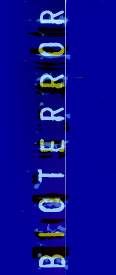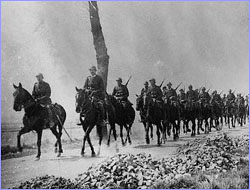|

|

|
|
|
 Allied cavalries, such as this Belgian convoy, may
have been the target of glanders attacks in World
War I.
Allied cavalries, such as this Belgian convoy, may
have been the target of glanders attacks in World
War I.
|
Agents of Bioterror
Glanders
incubation period |
symptoms |
how it would spread |
treatment |
vaccine
Glanders is a disease that primarily affects horses, mules,
and donkeys. In World War I, German forces reportedly spread
glanders to debilitate enemy cavalries. But the bacteria
that causes glanders, Burkholderia mallei, can also
infect humans.
Glanders is a likely candidate for biological warfare and
bioterrorism, in part, because only a few germs of
B. mallei can trigger disease. It also is known to
have been developed by various bioweapons programs. In a
single year in the 1980s, the Soviet Union produced more
than 2,000 tons of dry agent for glanders.
The bacteria can enter the body through cuts in the skin or
the membranes of the eyes and nose. The bacteria can also be
inhaled, and as an aerosol glanders would be a deadly
weapon.
Incubation period before symptoms
1-14 days
Symptoms
General symptoms:
- fever and headaches
- muscle aches, muscle tightness, chest pain
Other symptoms vary according to how the organism enters the
body—through the skin, eyes, nose, or respiratory
tract—but include:
-
pustular lesions that develop 1-5 days after bacteria
enter breaks in the skin
- swollen lymph nodes
- tearing of the eyes, light sensitivity
-
increased mucus in the eyes, nose, and respiratory tract
- pneumonia
How it would be spread
Aerosol. Human-to-human transmission is possible, but the
disease is not considered highly contagious.
Treatment
A variety of antibiotics can be used. However, even when
treated, the disease has had a high mortality rate (roughly
50%) in the few documented cases of human glanders.
Treatment protocols are not well understood because the
disease is so rare.
Vaccine
No vaccine is available.
Chart of the 8 agents
Photo: Corbis Images
History of Biowarfare
|
Future Germ Defenses
Interviews with Biowarriors
|
Global Guide to Bioweapons
|
Making Vaccines
Resources
|
Teacher's Guide
|
Transcript
|
Site Map
|
Bioterror Home
Search |
Site Map
|
Previously Featured
|
Schedule
|
Feedback |
Teachers |
Shop
Join Us/E-Mail
| About NOVA |
Editor's Picks
|
Watch NOVAs online
|
To print
PBS Online |
NOVA Online |
WGBH
©
| Updated November 2001
|
|
|
|